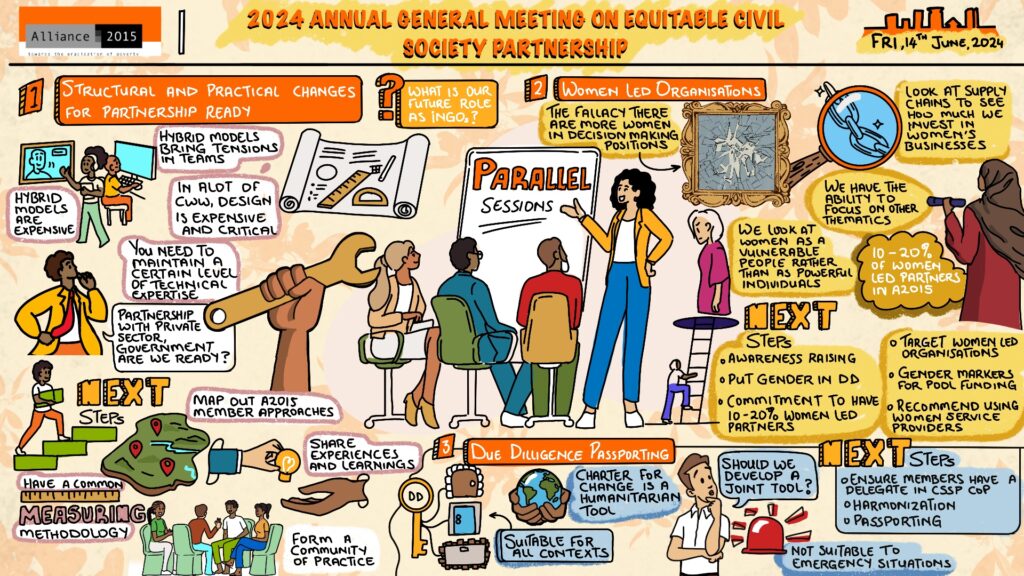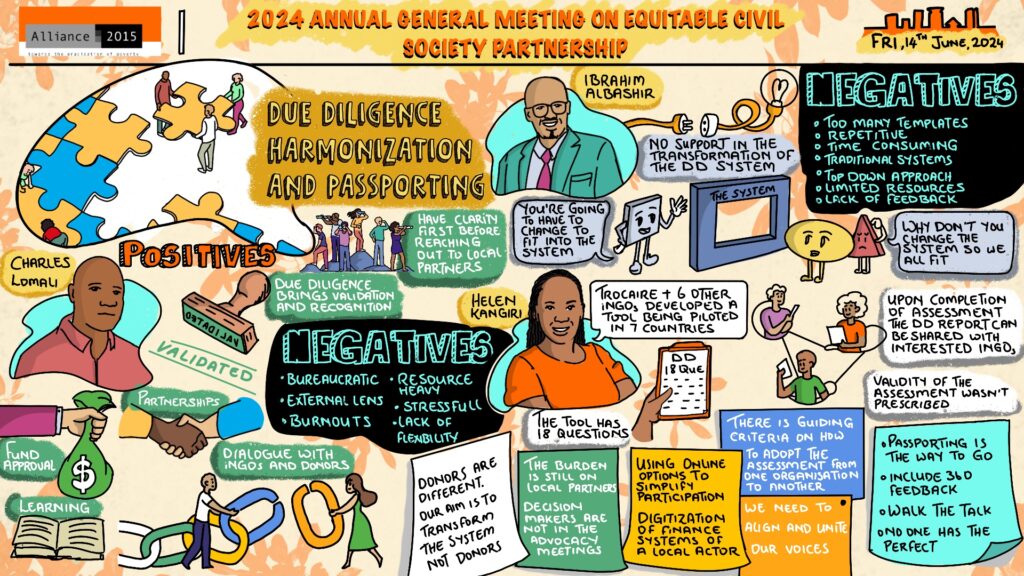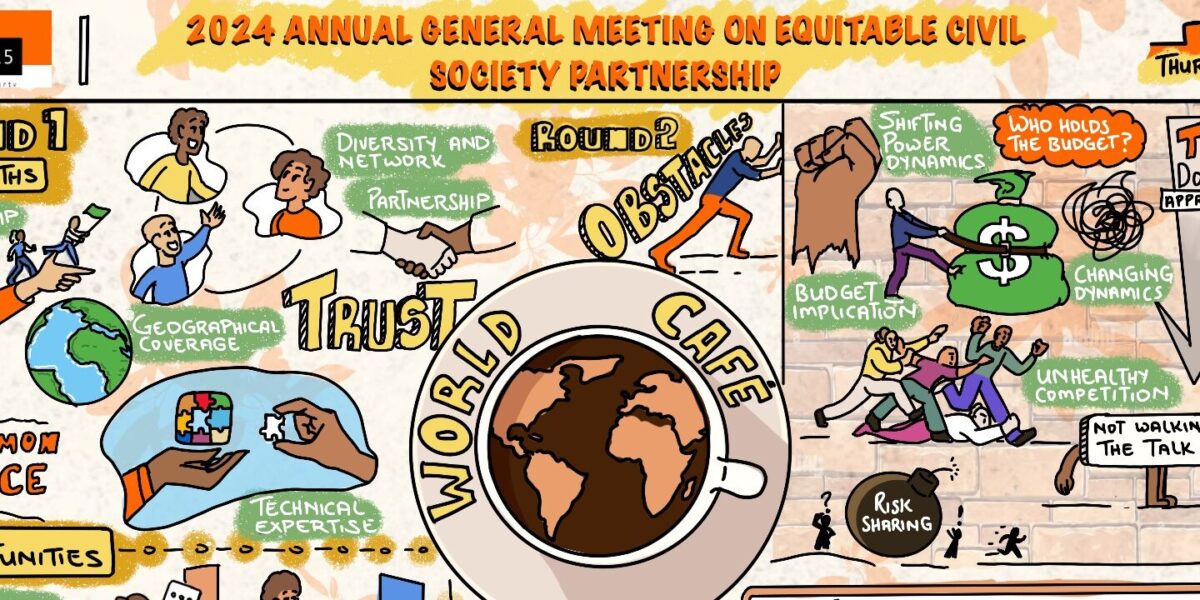Our Annual General Meeting took place on 13-14 June 2024. Here’s a wrap-up with some key reflections and next steps.
This year, the AGM had the following specific objective:
Establish a shared sense of the progress we’re making against the Strategic Compass’ Impact Goal 3 (Equitable civil society partnerships: contributing to more effective and inclusive local-to-global civil society collaboration).
AGM 2024 agenda.
Our key reflections
We’ve synthesized all the inputs captured in the materials listed above, so that both those that participated and those that couldn’t, can tap directly into a digested set of highlights. Read on to find our AGM insights and workstreams, and to confirm which groups in our structure will be picking up the insights and recommended actions.

1. Our role and vision towards building equitable CSO partnerships
Transitioning to equitable partnerships requires several important structural and mindset shifts:
- Move away from transactional to mutually beneficial relationships, with long-term commitment, investment, inclusion in decision making, and establishing clear, two-way mechanisms for transparency and accountability. Acknowledge that local NGOs are better placed to lead change; effective partnerships should find ways which fit respective capacities to optimise roles , allocate resources, share risks, and amplify advocacy efforts.
- Achieve better balance by mitigating risks between partners, having an honest dialogue on risk sharing.
- We need to move beyond a mindset of competition and control and stop viewing the empowerment of local CSOs as a threat to the existence of INGOs. The transformative changes we strive for can only be achieved with the active participation of CSOs.
- We need to acknowledge the crucial role of women-led CSOs and have strategic clarity about the special features of working with women-led and women-centered organizations. Thus, there is a call to Alliance2015 leadership to demonstrate political commitment and ensure quality funding to this purpose.
- Internal changes within organizations, such as conscious leadership, adjusting organizational culture and structures, mitigate the possibility of competition in favor of complementarity.
We need to be aware of and rebalance existing power dynamics:
- Reluctance to shift power from INGOs to local partners, leading to top-down approaches and control-oriented partnership tools based on the heritage of colonialism and aid system structure.
- Existing fear of losing visibility and influence, resulting in competition and protection of funding sources.
- Despite progress, the current system and donor frameworks are not effectively designed to support the shift towards truly locally led initiatives, as they often maintain existing power imbalances, funding constraints and priorities do not always match locally identified needs.
- Bias in seeing local partners as less capable, limiting their involvement in decision-making and leadership in projects.
- INGOs often treat the inclusion of women-led and centered organizations as an optional topic, often limiting their involvement to specific women/gender-related programming. Biases and trust issues exclude women-led organisations from the localization discourse and result in undervaluing their contribution to the sector. As a result, resource mobilization to grow organizations strategically is a challenge.
INGOs can be proactive intermediaries of the change by:
- Adjusting their leadership role after defining their ultimate goal in implementing localization; this would contribute to a shift in power dynamics, complemented by active exchange and increased awareness raising of the need for more equitable partnerships.
- Building internal capacities and making necessary structural changes.
- Ensuring local partners are involved in decision-making and leadership including discussions with donors to align on challenges and solutions, calling for direct funding and appropriate support for local needs.
- Fostering stronger engagement with local actors by creating platforms that emphasize collaboration and complementarities among partners.
- Advocating and standing alongside local NGOs, as they call for less administration and procedures that ”kill equity” through their cumbersome and non-strategic character.
- Acknowledging diversity and different levels of capacity among partners, and accordingly creating space for two-way capacity sharing acknowledging the skills, experience and knowledge of all partners.

2. Our continuous learning and experience-sharing in collaborating with CSOs
Making the most of our network’s experience:
- We represent a significant network of civil society relationships through our membership and our partnership relationships; amongst these, each organisation is at different stages of their journey toward equitable partnership and localisation. This diversity within our own membership offers a wealth of knowledge, practices, and experiences – including on working with women-led and centered organisations – from which we can mutually learn at all levels.
- Enhancing each other’s advocacy efforts is one of our potential strengths: Alliance2015 and our partners have different capacity and leverage to advocate on sensitive topics, and this allows to be more effective and to mitigate risks together.
- Partners value being part of consortia as peers, to understand challenges, compliance requirements and gain diverse experiences.
- Good practices:
- Consistently listening to partners and country programme teams through qualitative and quantitative feedback.
- Promoting peer-to-peer learning and mentorship, and increasing resources for partners, leading to better-qualified staff and more strategically anchored organisations.
Learning together about external context and constraints, and sharing lessons:
We identified several blockages in our ”ecosystem” including:
- Inequitable sharing of financial resources and insufficient support for administrative costs of local partners.
- Strict donor requirements and compliance rules which favour INGOs, making it challenging for local partners to compete and meet expectations.
- “push” for localisation, but each adopts different approaches and shun risk sharing. They focus on compliance and grants management formalities, which hinders building trust and truly equitable partnerships.
- Rigorously quantified financial thresholds, defined by donors to measure partnership, are reductionist. Developing and maintaining equitable partnerships is much more than funding.
- Shrinking civic spaces and politicization of aid are recurring phenomena which hinder collaboration and partnership growth. In some cases, governments impose local partners on INGOs to limit their scope of action, in some others, the allocation of priorities is due to political motivations.

3. Our Alliance2015 priorities for practical action to further our impact goal
- Complex and diverse compliance rules create barriers to equitable partnerships and lead INGOs to adopt stricter requirements to mitigate future risks. The due diligence process, while necessary and potentially useful to strengthen the capacities of local partners, is often overwhelmingly bureaucratic, repetitive and resource intense.
- Our aim as INGOs shall be to transform the system, lower barriers and to avoid transferring the burden on our local partners. Passporting due diligence processes within our network would be a key step to reduce this burden.
- Advocacy efforts can significantly amplify the voices of local partners and drive systemic change, but this requires intentional collaboration, resource mobilization, and inclusive engagement strategies.


What’s next?
You will have the opportunity to attend an online Info Session in late September, focused on our AGM theme and learnings.
The next Annual General Meeting (AGM) will be held as an online event, kindly co-hosted by our member Welthungerhilfe!
The AGM will have the following objectives:
- Establish a shared sense of our progress against our 2nd Impact Goal (transforming food systems to tackle hunger and malnutrition, prioritising sustainability, equity and the needs and rights of those who are marginalised) and
- Contribute to processing the learning from our current Strategic Compass (2021-2025) in view of co-building its next iteration (2026-2030).
Read the full report, with workstreams and who follows up what among our groups, on our SharePoint.


